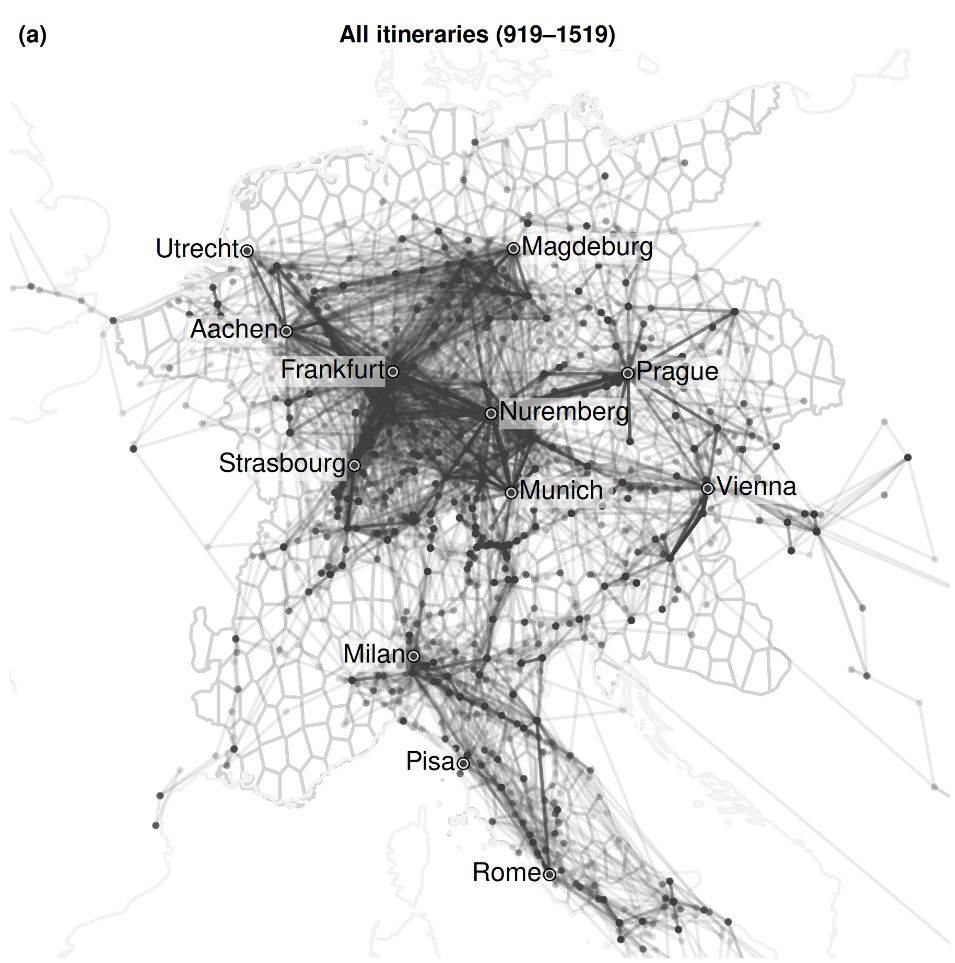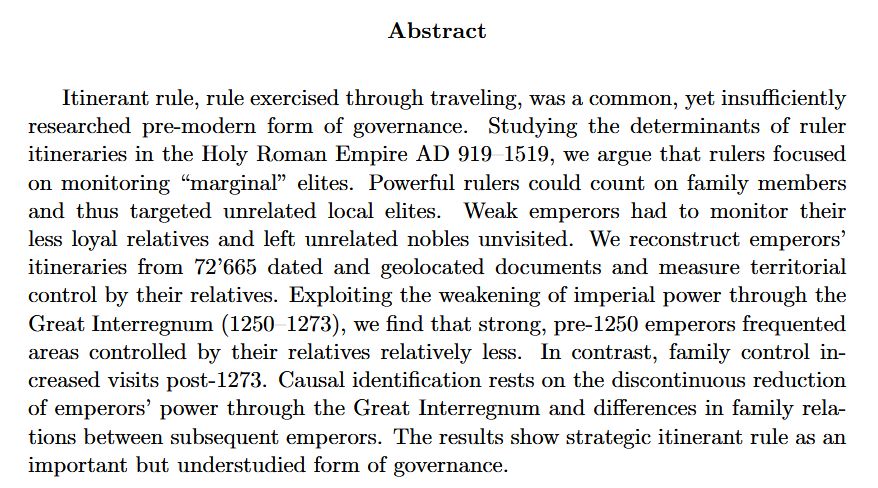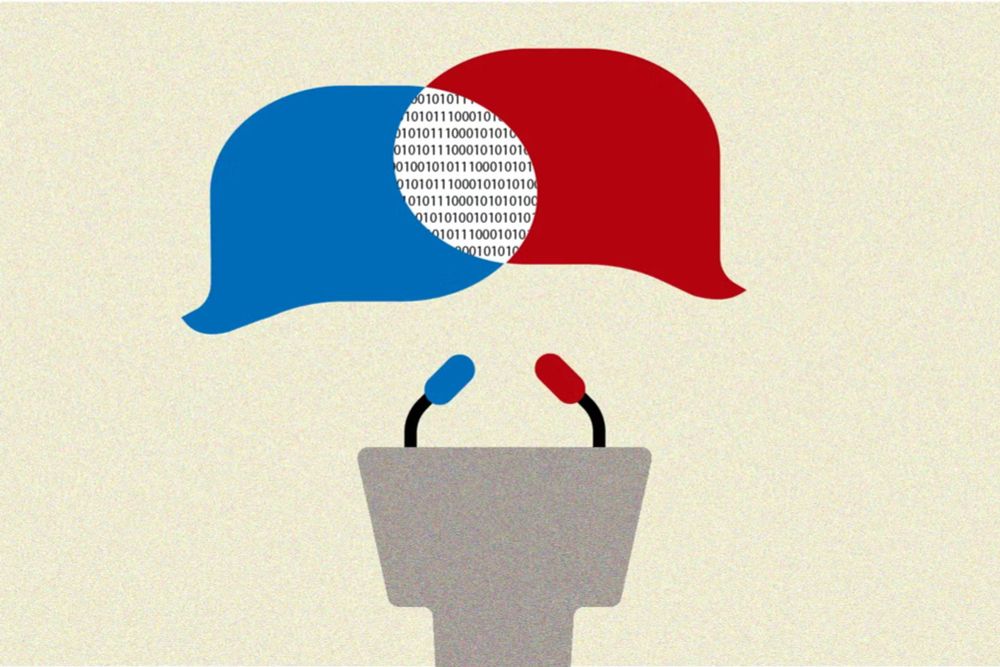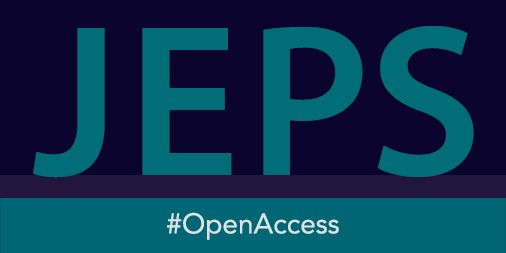
Why do citizens who say they support democracy tolerate leaders who dismantle it? Delighted to share my paper “Framing Democracy: How Elite Discourse Shapes Citizens' Understandings of Democracy and Enables Backsliding” is forthcoming in World Politics...(1/5, link at the end)
19.12.2025 08:11 —
👍 94
🔁 33
💬 3
📌 2

Itineraries of 25 Emperors of the Holy Roman Empire, 919 to 1519

Itinerant rule, rule exercised through traveling, was a common, yet insufficiently researched pre-modern form of governance. Studying the determinants of ruler itineraries in the Holy Roman Empire AD 919-1519, we argue that rulers focused on monitoring `marginal' elites. Powerful rulers could count on family members and thus targeted unrelated local elites. Weak emperors had to monitor their less loyal relatives and left unrelated nobles unvisited. We reconstruct emperors' itineraries from 72'665 dated and geolocated documents and measure territorial control by their relatives. Exploiting the weakening of imperial power through the Great Interregnum (1250-1273), we find that strong, pre-1250 emperors frequented areas controlled by their relatives relatively less. In contrast, family control increased visits post-1273. Causal identification rests on the discontinuous reduction of emperors' power through the Great Interregnum and differences in family relations between subsequent emperors. The results show strategic itinerant rule as an important but understudied form of governance.
🚨 Very excited that our paper on *Rulers on the Road* has been cond. accepted at the AJPS @ajpseditor.bsky.social. We analyze emperors' strategies of itinerant rule in the Holy Roman Empire 919-1519. Fun working with @claranw.bsky.social, @andrejkokkonen.bsky.social & Jørgen Møller shorturl.at/Spm7z
29.04.2025 15:43 —
👍 168
🔁 39
💬 10
📌 8

Text reads: About synthetic panels
Recruiting the right participants for a study can be difficult. You may not get the exact demographics you need, and the shorter the deadline, the less sure you can be that everyone will answer on time. One possible solution can be to use synthetic panels.
Synthetic panels are powered by a first party proprietary AI model developed here at Qualtrics. Our synthetic panel is trained on thousands of responses from a variety of demographic backgrounds in order to more accurately predict how certain populations would respond to a survey.
Our synthetic panel is based on the United States General Population, and is only available in English. This panel comes with ready-made quotas and target breakouts in order to represent your chosen population and make it easy to launch your survey right away.

Text reads:
Question-writing best practices
To get the most reliable and actionable results from synthetic audiences, consider these question-writing best practices:
Ask forward-looking and attitudinal questions.
Synthetic panels perform best with perceptions, preferences, and intent-based questions. For example, “How likely are you to try…?”
Synthetic panels are less applicable for studies on past behaviors, detailed recall, brand recall, or awareness questions. For example, “When did you last visit…?”

Text reads:
Discussion
The current study aimed to conduct a meta-analysis of the TPB when applied to health behaviours which addressed the limitations of previous reviews by including only prospective tests of behaviour, applying RE meta-analytic procedures, correcting correlations for sampling and measurement error, and hierarchically analysing the effect of behaviour type and sample and methodological moderators. Some 237 tests were identified which examined relations amongst model components. Overall the analysis indicated that the TPB could explain 19.3% of the variance in behaviour and 44.3% of the variance in intention across studies. This level of prediction of behaviour is slightly lower than that of previous meta-analytic reviews which have found between 27% (Armitage & Conner, 2001; Hagger et al., 2002) and 36% (Trafimow et al., 2002)
of the variance in behaviour to be explained by intention and PBC.
Did you know that from tomorrow, Qualtrics is offering synthetic panels (AI-generated participants)?
Follow me down a rabbit hole I'm calling "doing science is tough and I'm so busy, can't we just make up participants?"
16.12.2025 17:38 —
👍 657
🔁 288
💬 38
📌 225


Name assimilation increases immigrants' earnings A LOT.
osf.io/preprints/so...
29.11.2025 01:27 —
👍 70
🔁 26
💬 0
📌 0

A hidden gem for PolSci in an Econ journal: mainstream right-wing parties seem to capture only a fraction (!) of the far-right vote when the latter don't run in an election. Crucially, left parties seem to gain votes! A key finding for understanding potential coalitions doi.org/10.1016/j.jp...
28.11.2025 11:21 —
👍 32
🔁 14
💬 3
📌 0

AI rivals humans in political persuasion
New research reveals that people find AI-delivered political arguments convincing. This could help bridge political divides – or fuel polarization.
@robbwiller.bsky.social, Director of our #AI and the Future of #SocialScience program, spoke with the Stanford Report about his recent research showing that AI-generated political messages can be as persuasive as those developed by humans.
Learn more ⤵️
26.11.2025 16:32 —
👍 7
🔁 2
💬 0
📌 0

Legislators talk less about the future as they age | The Journal of Politics: Vol 0, No ja
NEW ARTICLE: @palesl.bsky.social, Vesa Koskimaa and I have an letter out in JOP, "Politicians talk less about the future as they age" doi.org/10.1086/739406 (1/10)
21.11.2025 12:53 —
👍 69
🔁 24
💬 3
📌 3

Assistant Professor, Associate Professor or Full Professor of Cognitive Science - Vacancy at Aarhus University
Vacancy at School of Communication and Culture - Linguistics, Cognitive Science and Semiotics, Dept. of, Aarhus University
CogSci in Aarhus is hiring, open rank (assi, asso or full prof).
We want somebody working on and teaching computational modelling of cognitive processes and/or social processes. Students are amazing, work/life balance very satisfactory, and colleagues are nice!
international.au.dk/about/profil...
26.11.2025 11:38 —
👍 63
🔁 53
💬 2
📌 4

New Publication with @lhaffert.bsky.social in @ejprjournal.bsky.social!
We study the role of generations in the urban-rural divide, which is increasingly shaping the politics of many democracies.
Studying Switzerland, we show: The urban-rural divide is stronger among younger generations. (1/10) 🧵👇
24.11.2025 09:47 —
👍 120
🔁 46
💬 2
📌 3

Thrilled to share my new article in Political Psychology: “The psychology of political attitudinal volatility.” In it, I attempt to answer why do some people change their political views more than others? Open access at: onlinelibrary.wiley.com/doi/epdf/10....
@ispp-pops.bsky.social
25.11.2025 15:07 —
👍 68
🔁 31
💬 0
📌 1


“Understanding the mind requires understanding history, because psychology is not only constructed in the present but shaped through deep historical time.”
—Jackson and Atari on the key questions Historical Psychology can help address:
buff.ly/U0pPHZm
23.11.2025 09:18 —
👍 2
🔁 2
💬 0
📌 0
Happy that our paper with @bogatyrev.bsky.social, @tabouchadi.bsky.social, @heikekluever.bsky.social, and @lstoetze.bsky.social found a home at @thejop.bsky.social. You can read it here 👇
www.journals.uchicago.edu/doi/10.1086/...
Thanks to all the fantastic people giving feedback and supporting us
22.11.2025 19:27 —
👍 111
🔁 30
💬 1
📌 1


So there you have it, twin study estimates were greatly inflated, and molecular data sets the record straight. I walk through possible counter-arguments, but ultimately the uncomfortable truth is that genes contribute to traits much less than we always thought.
21.11.2025 22:33 —
👍 135
🔁 43
💬 4
📌 8

Logo of JEPS with the hashtag OpenAccess on a dark blue background.
#OpenAccess from @jepsjournal.bsky.social -
Partisan Homogeneity Does Not Increase Collaborative Corruption - https://cup.org/3K65wB9
- @cerpintaxt.bsky.social, Florian Erlbruch & Markus Stephan Tepe
#FirstView
20.11.2025 11:20 —
👍 1
🔁 3
💬 0
📌 0

🚨Out in PNAS🚨
Examining news on 7 platforms:
1)Right-leaning platforms=lower quality news
2)Echo-platforms: Right-leaning news gets more engagement on right-leaning platforms, vice-versa for left-leaning
3)Low-quality news gets more engagement EVERYWHERE - even BlueSky!
www.pnas.org/doi/10.1073/...
14.11.2025 14:35 —
👍 219
🔁 106
💬 11
📌 8

IN NEW ISSUE: Elite Cooperation and Affective Polarization: @markuswagner.bsky.social & @eelcoharteveld.bsky.social examine the link between the two by using 20 years of German coalitions data - buff.ly/DoGL3EA (OPEN ACCESS)
@polstudiesassoc.bsky.social @uoypolitics.bsky.social @sagepub.com
12.11.2025 22:00 —
👍 7
🔁 3
💬 0
📌 0

News Influencers Fact Sheet
About one-in-five U.S. adults say they regularly get news from news influencers on social media, and this is especially common among younger adults.
About one-in-five U.S. adults (21%) say they regularly get news from news influencers on social media. Among 18- to 29-year-olds, that figure jumps to 38%.
12.11.2025 17:30 —
👍 8
🔁 5
💬 0
📌 4

We are at our most certain about an issue when we have thoroughly researched it and considered all relevant angles.
Only one thing can make us more certain.
Ignorance.
buff.ly/w8OaZGn
12.11.2025 09:18 —
👍 2
🔁 1
💬 0
📌 0

Perspectives on Politics banner with a cityscape background. Below, a graffiti quote says, "First they came for the journalists and I did not speak out, because they said it was all 'fake news'." The hashtag #OpenAccess is visible at the bottom.
#OpenAccess from @poppublicsphere.bsky.social -
Do Authoritarians Support Political Violence? - https://cup.org/43p5yL9
- Bryan T. Gervais, Connor Dye, Gabriel Acevedo, Christopher G. Ellison & Margaret S. Kelley
#FirstView
12.11.2025 09:20 —
👍 2
🔁 2
💬 0
📌 0
🚨 NEW in @bjpols.bsky.social : When Partygate hit Westminster, trust in Scottish politicians increased. Our experiments reveal a "contrast effect" - scandals at one level can make the other look better by comparison. Who lost most trust in Westminster? Scottish unionists. Read now #OpenAccess 👇
11.11.2025 09:00 —
👍 49
🔁 32
💬 1
📌 1


Do architecture and urban planning affect political behavior? Happy to share a paper that @tesaliarizzo.bsky.social and I have coming out at the APSR which uses computer vision to investigate how the built environment shapes inequalities in civic participation in Mexico: osf.io/preprints/so.... 🧵1/5
08.11.2025 21:29 —
👍 45
🔁 10
💬 1
📌 1

Physiognomy—an old belief that one’s character is reflected in one’s facial features—is now widely regarded as pseudoscience.
@bxjaeger.bsky.social et al find it remains common among laypeople across demographics, and is associated with intuitive thinking:
buff.ly/iVz5gYY
09.11.2025 09:18 —
👍 4
🔁 2
💬 1
📌 0

Cool new working paper on why and how cable news threw gasoline on the culture war fire. The culture war isn't optimal for electoral candidates, but it's optimal for cable news companies.
ungated: www.dropbox.com/scl/fi/27v4x...
03.11.2025 19:45 —
👍 218
🔁 63
💬 4
📌 4

Four three-year postdoctoral positions in the project Slow-Motion Democracy - Vacancy at Aarhus University
Vacancy at Department of Political Science, Aarhus University
Four (!) three-year postdoc positions available at @au.dk: international.au.dk/about/profil...
Join an incredible team & help understand the psychological & political implications of the clash between high-speed society & slow-speed democracy.
Please share! @tboeggild.bsky.social can help with Qs
06.11.2025 14:14 —
👍 30
🔁 35
💬 0
📌 1

Too honest and humble to run for office? Citizens’ personality traits, nascent ambition, and recruitment | European Journal of Political Research | Cambridge Core
Too honest and humble to run for office? Citizens’ personality traits, nascent ambition, and recruitment
🆕 What kind of personalities are drawn to politics? 🗳️
This cross-national study across 🇨🇦🇩🇰🇮🇱🇳🇱🇨🇭 explores #Representation and how honesty-humility and other HEXACO personality traits shape people’s ambition to run for office 🧵1/2
buff.ly/xk4qMa3
05.11.2025 12:02 —
👍 11
🔁 9
💬 1
📌 0




































